Top Rankings
Sioux County School District ranks among the top 20% of public school district in Nebraska for:
Category
Attribute
Student Attention
Lowest student:teacher ratio (Top 1%)
For the 2025 school year, there is 1 public high school serving 24 students in Sioux County School District.
ÎŰÎŰÂţ» High Schools in Sioux County School District have a diversity score of 0.35, which is less than the Nebraska public high school average of 0.54.
ÎŰÎŰÂţ» High School in Sioux County School District have a Graduation Rate of 50%, which is less than the Nebraska average of 84%.
The school with highest graduation rate is Sioux County High School, with ≥50% graduation rate. Read more about public school graduation rate statistics in Nebraska or national school graduation rate statistics.
Minority enrollment is 21% of the student body (majority Hispanic), which is less than the Nebraska public high school average of 36% (majority Hispanic).
Overview
This School District
This State (NE)
# Schools
4 Schools
339 Schools
# Students
88 Students
106,970 Students
# Teachers
19 Teachers
8,163 Teachers
Student : Teacher Ratio
5:1
5:1
District Rank
Sioux County School District, which is ranked within the bottom 50% of all 245 school districts in Nebraska (based off of combined math and reading proficiency testing data) for the 2021-2022 school year.
The school district's graduation rate of 50% has stayed relatively flat over five school years.
Overall District Rank
#200 out of 246 school districts
(Bottom 50%)
(Bottom 50%)
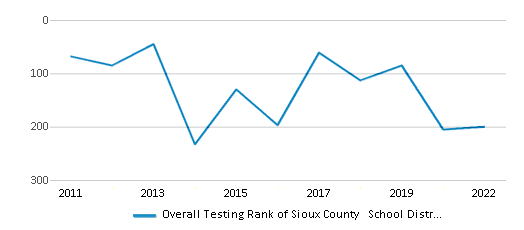
Math Test Scores (% Proficient)
40-49%
46%
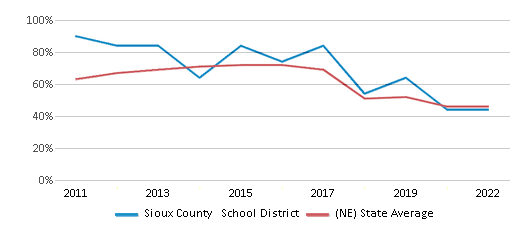
Reading/Language Arts Test Scores (% Proficient)
30-39%
47%
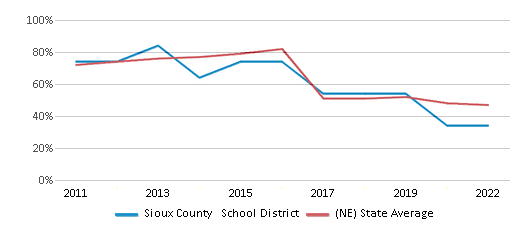
Science Test Scores (% Proficient)
60-79%
62%
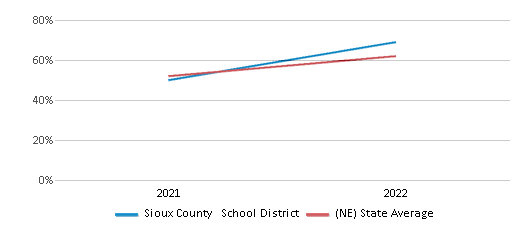
Graduation Rate
≥50%
87%
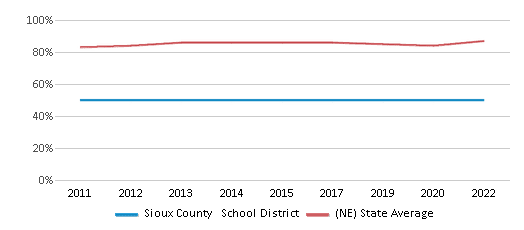
Students by Ethnicity:
Diversity Score
0.26
0.54
# American Indian Students
1 Student
1,379 Students
% American Indian Students
1%
1%
# Asian Students
n/a
2,798 Students
% Asian Students
n/a
3%
# Hispanic Students
9 Students
23,072 Students
% Hispanic Students
10%
22%
# Black Students
n/a
6,797 Students
% Black Students
n/a
6%
# White Students
75 Students
68,557 Students
% White Students
85%
64%
# Hawaiian Students
n/a
161 Students
% Hawaiian Students
n/a
n/a
# Two or more races Students
3 Students
4,206 Students
% of Two or more races Students
4%
4%
Students by Grade:
# Students in PK Grade:
2
56
# Students in K Grade:
11
34
# Students in 1st Grade:
4
35
# Students in 2nd Grade:
8
40
# Students in 3rd Grade:
2
40
# Students in 4th Grade:
9
36
# Students in 5th Grade:
7
31
# Students in 6th Grade:
7
40
# Students in 7th Grade:
6
3,507
# Students in 8th Grade:
8
3,589
# Students in 9th Grade:
3
25,222
# Students in 10th Grade:
6
25,356
# Students in 11th Grade:
8
23,606
# Students in 12th Grade:
7
25,378
# Ungraded Students:
-
-
District Revenue and Spending
The revenue/student of $40,727 is higher than the state median of $15,464. The school district revenue/student has grown by 14% over four school years.
The school district's spending/student of $36,148 is higher than the state median of $16,776. The school district spending/student has grown by 14% over four school years.
Total Revenue
$4 MM
$5,080 MM
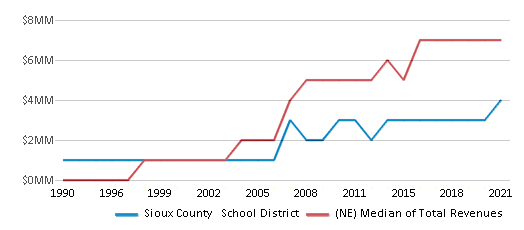
Spending
$3 MM
$5,511 MM
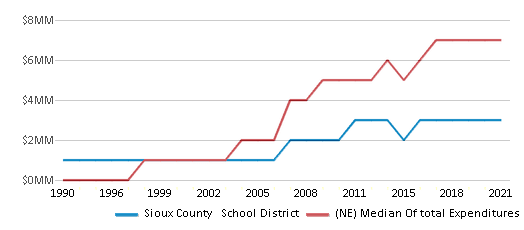
Revenue / Student
$40,727
$15,464
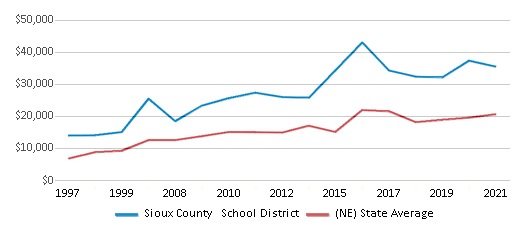
Spending / Student
$36,148
$16,776
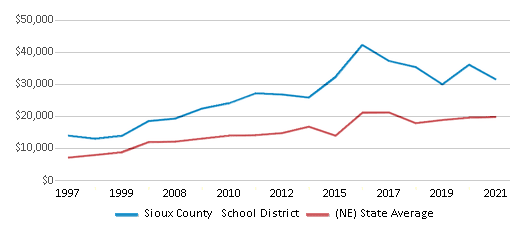
Best Sioux County School District ÎŰÎŰÂţ» High Schools (2025)
School
(Math and Reading Proficiency)
(Math and Reading Proficiency)
Location
Grades
Students
Rank: #11.
Sioux County High School
(Math: <50% | Reading: <50% )
Rank:
Rank:
6/
Top 50%10
435 Kate
Harrison, NE 69346
(308) 668-2415
Harrison, NE 69346
(308) 668-2415
Grades: 9-12
| 24 students
Recent Articles

Year-Round Or Traditional Schedule?
Which is more appropriate for your child? A year-round attendance schedule or traditional schedule? We look at the pros and cons.

Why You Should Encourage Your Child to Join a Sports Team
Participating in team sports has a great many benefits for children, there is no doubt. In this article you will learn what those benefits are.

White Students are Now the Minority in U.S. ÎŰÎŰÂţ» Schools
Increasing birth rates among immigrant families from Asia and Central and South America, combined with lower birth rates among white families, means that for the first time in history, public school students in the United States are majority-minority. This shift in demographics poses difficulties for schools as they work to accommodate children of varying language abilities and socio-economic backgrounds.





